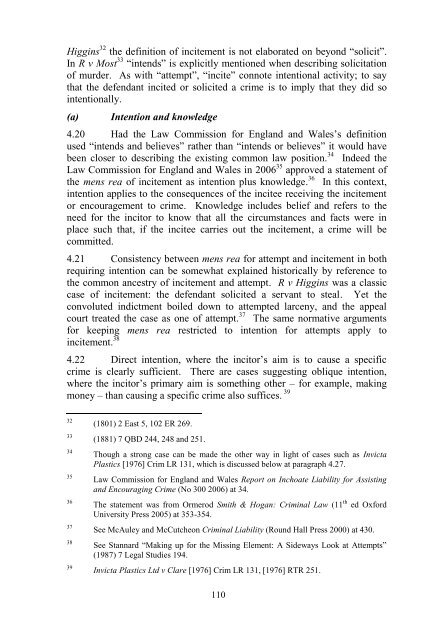Consultation Paper on Inchoate Offences - Law Reform Commission
Consultation Paper on Inchoate Offences - Law Reform Commission
Consultation Paper on Inchoate Offences - Law Reform Commission
Create successful ePaper yourself
Turn your PDF publications into a flip-book with our unique Google optimized e-Paper software.
Higgins 32 the definiti<strong>on</strong> of incitement is not elaborated <strong>on</strong> bey<strong>on</strong>d “solicit”.In R v Most 33 “intends” is explicitly menti<strong>on</strong>ed when describing solicitati<strong>on</strong>of murder. As with “attempt”, “incite” c<strong>on</strong>note intenti<strong>on</strong>al activity; to saythat the defendant incited or solicited a crime is to imply that they did sointenti<strong>on</strong>ally.(a)Intenti<strong>on</strong> and knowledge4.20 Had the <strong>Law</strong> Commissi<strong>on</strong> for England and Wales‟s definiti<strong>on</strong>used “intends and believes” rather than “intends or believes” it would havebeen closer to describing the existing comm<strong>on</strong> law positi<strong>on</strong>. 34 Indeed the<strong>Law</strong> Commissi<strong>on</strong> for England and Wales in 2006 35 approved a statement ofthe mens rea of incitement as intenti<strong>on</strong> plus knowledge. 36 In this c<strong>on</strong>text,intenti<strong>on</strong> applies to the c<strong>on</strong>sequences of the incitee receiving the incitementor encouragement to crime. Knowledge includes belief and refers to theneed for the incitor to know that all the circumstances and facts were inplace such that, if the incitee carries out the incitement, a crime will becommitted.4.21 C<strong>on</strong>sistency between mens rea for attempt and incitement in bothrequiring intenti<strong>on</strong> can be somewhat explained historically by reference tothe comm<strong>on</strong> ancestry of incitement and attempt. R v Higgins was a classiccase of incitement: the defendant solicited a servant to steal. Yet thec<strong>on</strong>voluted indictment boiled down to attempted larceny, and the appealcourt treated the case as <strong>on</strong>e of attempt. 37 The same normative argumentsfor keeping mens rea restricted to intenti<strong>on</strong> for attempts apply toincitement. 384.22 Direct intenti<strong>on</strong>, where the incitor‟s aim is to cause a specificcrime is clearly sufficient. There are cases suggesting oblique intenti<strong>on</strong>,where the incitor‟s primary aim is something other – for example, makingm<strong>on</strong>ey – than causing a specific crime also suffices. 393233343536373839(1801) 2 East 5, 102 ER 269.(1881) 7 QBD 244, 248 and 251.Though a str<strong>on</strong>g case can be made the other way in light of cases such as InvictaPlastics [1976] Crim LR 131, which is discussed below at paragraph 4.27.<strong>Law</strong> Commissi<strong>on</strong> for England and Wales Report <strong>on</strong> <strong>Inchoate</strong> Liability for Assistingand Encouraging Crime (No 300 2006) at 34.The statement was from Ormerod Smith & Hogan: Criminal <strong>Law</strong> (11 th ed OxfordUniversity Press 2005) at 353-354.See McAuley and McCutche<strong>on</strong> Criminal Liability (Round Hall Press 2000) at 430.See Stannard “Making up for the Missing Element: A Sideways Look at Attempts”(1987) 7 Legal Studies 194.Invicta Plastics Ltd v Clare [1976] Crim LR 131, [1976] RTR 251.110
















